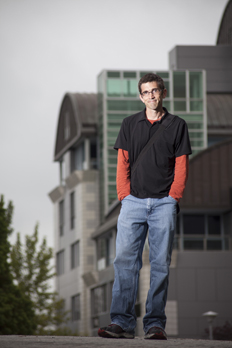

Dr Dan Farhat
Staff profile
Economics
Dr Dan Farhat studies vampires. It's unusual research for an economist, but advances in computing and social simulation make it possible.
“Most of my work involves building synthetic economies. We can use computers to construct entire populations of artificial individuals. Each person makes decisions about resource use and interacts with others according to rules I set for them. Economies that we can study start to develop.”
The idea is to understand economic activity by creating it, a technique that combines ideas from economics, information science, biology, organisational studies, and many of the social sciences.
Dan has used this approach to study fluctuations in consumer spending, trends in unemployment, how educational achievement affects earnings, how scientists produce research, and now how a community of humans plagued by vampires would fare.
“How do people use their resources to combat vampires? How do vampires choose the best victims? What are the social consequences of these choices? Those are all economics questions.
“A lot of students think economics is just crunching numbers and solving equations to find prices and quantities. But it's really all about human behaviour and decisions. There'll be some maths and stats, but at the end of the day we want to understand people.”
Using computers is vital. “Otherwise I'd have to collect data from real vampires, and that's super dangerous. You know what they're like. It wouldn't be easy to hire research assistants for that — or ensure they'd make it back with the data.”
But are vampires real? ”Sure they are, they just don't drink blood like in the movies. A 'vampire' is anyone who preys on others for their own benefit — criminals, corrupt governments, abusive employers….”
Dan's vampires help make economics enjoyable. “It's good to emphasise the broad range of topics economics relates to. There's something for everyone. You can't afford to be ordinary anymore. That's the great thing about working and studying at Otago – everyone is encouraged to stand out and be innovative.”
